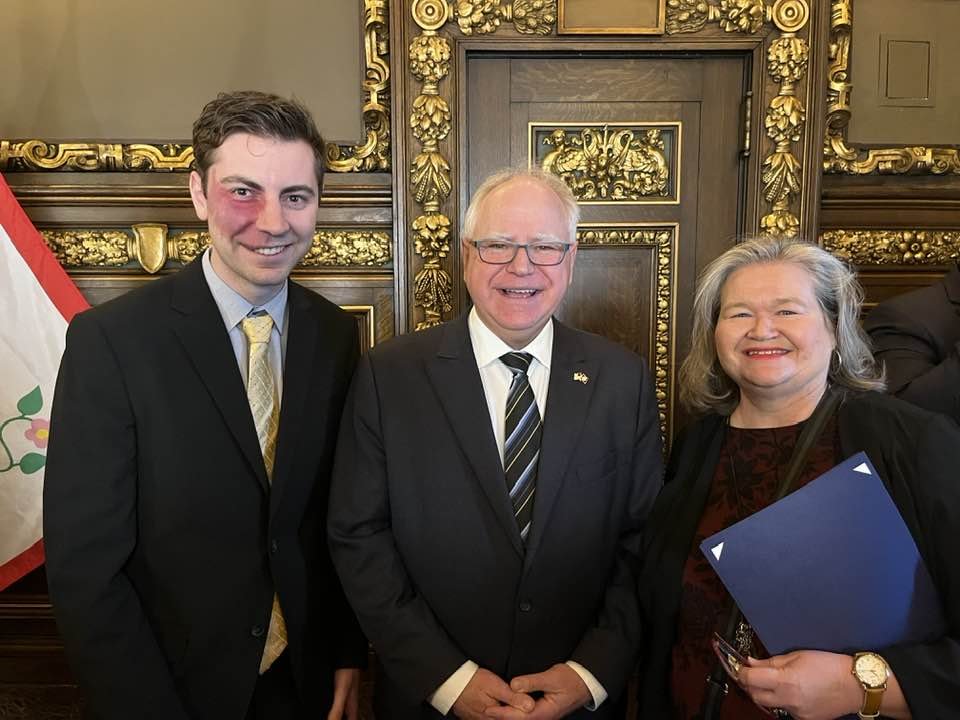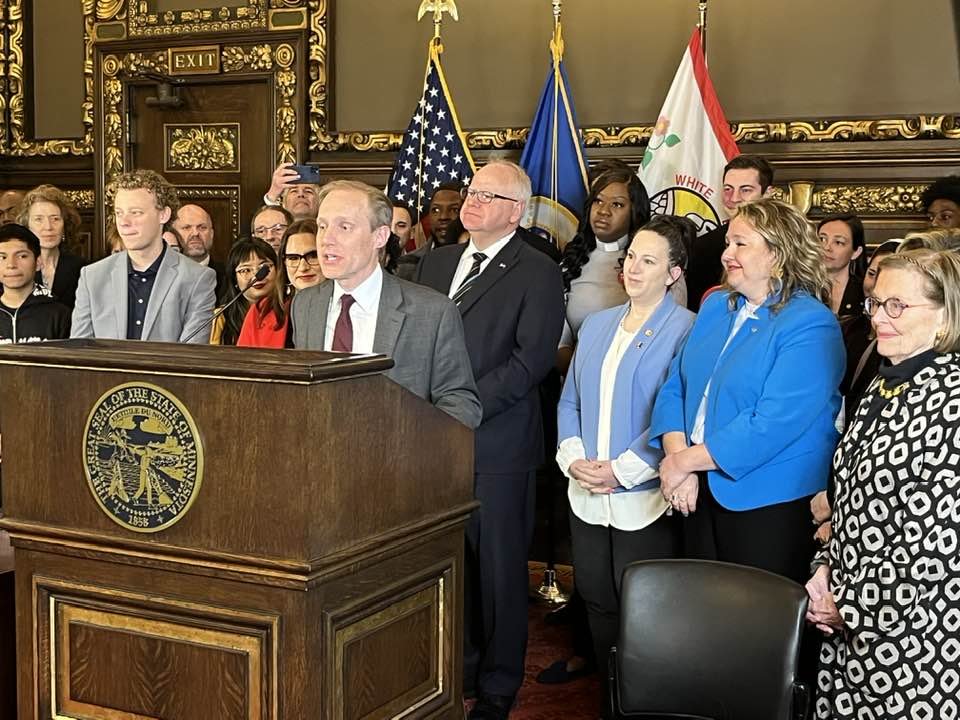Capitol Letter for May 5, 2023
The Capitol Letter™ is a recurring publication that provides reports from LWV Minnesota volunteer Observer Corps and Lobby Corps members on what is happening in the current legislative session.
LWVMN Advocacy
TIME TO CELEBRATE! Secure Automatic Voter Registration (AVR), pre-registration for 16 and 17 year olds, and permanent absentee ballot lists were Signed by Governor Walz on Friday!! The League of Women Voters Minnesota worked alongside former Secretary of State Joan Growe (pictured on the right), and we will continue our mission to defend democracy and empower voters with this historic legislation. The joyous bill signing featured the We Choose Us coalition, engaged youth, and state leaders in the “democracy business”. Implementing these pro-voter laws is the next step.
Observer Reports
House Floor Session - Tuesday, May 2
LWVMN Observer Corps Member Cindy Holker
The May 2nd House floor session included a discussion and vote on HF2, otherwise known as Paid Family and Medical Leave. Several amendments were offered. The A78 was the only amendment that passed with bipartisan support and it included a provision that if there is probable cause of fraud it must be reported to the county attorney, for both the employee and employer. Several other amendments were offered but did not pass. These included: DE2 which essentially replaced the entire bill with a proposal offered by the Republicans (GOP) that mirrors a privately administered plan in New Hampshire. According to the Democrat (DFL) majority, this program is more costly than the program in HF2. Another amendment was proposed and not passed that would exempt employers with less than 50 employees from the bill's requirements. Finally, there was an amendment that would have capped the cost of the plan to 1% of an employees' taxable wages. The House currently has a cap of .7%, and the bill is capped in the Senate at 1.2%. The GOP used MNSure as an example where, once implemented, the cost needed to be increased to match the program’s needs by the legislature.
Additional GOP arguments included: Huge surplus yet $10 billion more in taxes have been added during the session. Cost is too high and would put many small businesses out of business. One size fits all proposal with no ability for individual businesses to provide plans that they could afford. Government is the most inefficient way to provide a plan. MNSure and a $600 million cost to provide an administrative website for the program (Utah only spent $600K) was used over and over as a reason why not to pass this bill.
DFL arguments included: Free market has not stepped in and provided this benefit. The top employers continue to improve these plans to attract employees but smaller ones have not and that fact heavily impacts women and people of color in a negative way. All people deserve this benefit whether they work for a large Fortune 500 or work in our schools, small businesses, are self-employed, etc.
Bill passed along party lines with DFL Representatives Lislegard and Pelowski voting against the bill.
Conference Committee on SF2909 - Omnibus Judiciary and Public Safety Appropriations. Authors: Sen. Latz/Reps. Moller and Becker-Finn
LWVMN Observer Corps Member Marti Micks
Tuesday, May 2: There wasn't debate; it was descriptive of the side by side differences in funding by the Senate and the House for similar bills. The Senate wants to create a $100 million community crime and violence prevention fund, with $20 million set aside for local grants. The Senate bill has mandatory minimums for crimes committed with firearms; the House does not have this in their bill. Side by side the bills were not yet ready. No votes were taken.
Wednesday, May 3: The meeting was short (38 minutes). Committee had the side-by-side language of House and Senate versions. Most of the motions were to adopt the Senate language. All motions passed unanimously, except one in which Sen. Pappas wanted elected officials to be authorized to officiate civil marriages instead of anyone who registers as an officiant. No firearms provisions were discussed. There will be further public testimony on provisions in which Senate and House versions have policy differences. Policies to be discussed will be put on the calendar so the public knows before the meeting.
Thursday, May 4: Public testimony was taken on select provisions in the bill: funding for the Judiciary for both Judges and staff (hard to keep staff as salaries are low, no increase in salaries last year); funding for arts in prison, funding for prisoner phone calls because cost of prisoner phone calls can be several thousand a year and most families cannot afford this as high percentage of their families are in poverty. Prison phone calls are expensive because the calls have to be monitored by staff. No votes were taken. The side by side is ready. The conference committee is in recess, but supposedly the calendar will show which sections will be discussed and public testimony may be given.
Conference Committee on HF1830; State Government and Elections Omnibus - Thursday, May 4
LWVMN Observer Corps Member Paul Huffman
This was the 3rd meeting of the week for this Conference Committee that includes HF1830 (House Omnibus State and Local Government Finance bill), HF1826 (State and Local Government Policy Bill), SF1362 (Senate Omnibus Elections Policy Bill), SF1424 (Senate Omnibus State Government Policy Bill), and SF1426 (Senate Omnibus State Government and Elections Appropriations). It's important to note that the committee is composed of 9 DFL members and 1 Republican Member (Rep. Nash). (Coverage of what’s all included)
The initial two meetings (on Monday and Wednesday) were primarily line by line reviews of the side-by-sides for appropriations, for State and Local policy, and Grants. The Monday hearing also included some testimony. There was also a conference committee meeting on Friday that adopted a number of state policy items unrelated to elections and voting. Thursday’s meeting was focused on reviewing election policy side-by-side and reviewing the Same or Similar items between the House Omnibus (1830) and the 2 Senate bills (1362 and 1426), and the standalone items between the bills. Only those standalone items that were either technical or narrow or which had no significant difference in policy position between the chambers were passed in this hearing.
Noteworthy items that were passed included procedures and dates for Early Voting; Election Official Intimidation; National Popular Vote (NPV) Compact; changes in student residential ID and postsecondary voter registration and information; Canvassing Board required to select candidate with most votes; remove geographic restrictions on small city all-mail voting; allowed absence from work to vote; ballot delivery to individuals in assisted living and awaiting trial; temporary voting locations and tribal polling places; and electronic signature option on voting rosters.
Some significant items that have not been included as yet include: Ranked Choice Voting; Partisan candidate rotation (the chambers have a difference in how they want to approach this); Major Party designation; and local election funding process. There is indication that discussions within the majority election members are continuing on approaches to these items.
Minnesota House News & Related Coverage
House Week in Review: May 1-5
Including Breakdowns of the Agriculture, Environment & Climate, and Transportation Omnibus Bills in Conference Committee
Senate DFL Passes Tax Package with Slight Differences from the House
100% Campaign: What’s In Play For Climate Budgets
Proposal to Reauthorize the Environmental and Natural Resources Trust Fund (ENRTF) on the 2024 Ballot advances to a floor vote with changes
Statewide Ranked Choice Voting Still Years Away from Consideration in Minnesota
MN House Members Take Breaks During Floor Votes and Senators Can Vote Virtually
Mayo Clinic Threatens to Pull Billions in Investments Over Proposed Legislation
Please learn more at our 2023 Legislative Session Webpage.



